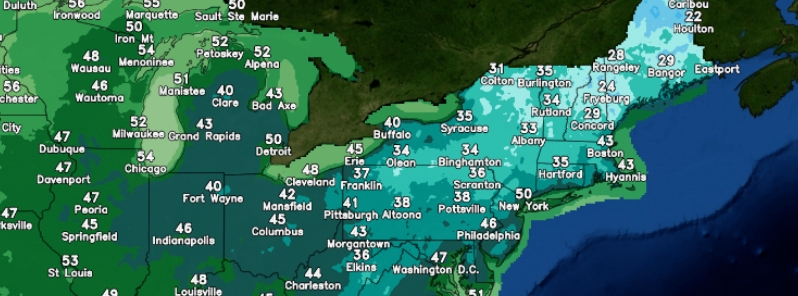Scores of temperature records smashed as cold blast sweeps through Eastern U.S.

Dozens of temperature records were smashed or tied across the Eastern U.S. over the weekend as a shot of cold air swept through the region, weeks ahead of the average for much of the area. The National Weather Service (NWS) issued frost advisories and freeze warnings through 13:00 UTC (09:00 LT) on Monday, September 21, 2020.
Parts of the northern Plains were the first to witness frosts and feel the chill last week. In Minnesota, International Falls registered -5 °C (23 °F) on Thursday night, September 17, smashing the previous record of -4.4 °C (24 °F) for the date set in 1959.
Duluth smashed a 91-year-old record Friday morning, September 18, when temperatures pummelled to -2.2 °C (28 °F). The previous record for the date was -1.7 °C (29 °F), set in 1929. It's worthy to note that Duluth also set another record for the warmest low of 18 °C (65 °F) on September 18, 2019.
Over the weekend, residents from Michigan to New England were gripped by cold and thick frost.
On Saturday, September 19, more than a dozen low-temperature records were broken or tied for the date, including the following: Arkon-Canto in Ohio registered 3.3 °C (38 °F), breaking the past record low of 3.9 °C (39 °F) set in 1956; Binghamton in New York registered 1.7 °C (35 °F), tying with the record in 1959; Concord in New Hampshire with -2.2 °C (28 °F), surpassing the past record of -1.1 °C (30 °F) in 1990.
Saturday morning was a one chilly one across parts of the Northeast with several locations breaking or tying their low temperature record for September 19th. More chilly temperatures are expected Sunday morning. pic.twitter.com/MGbtuLsUtv
— NWS Eastern Region (@NWSEastern) September 19, 2020
The cold snap marked the end of the growing season for much across the Great Lakes and interior Northeast.
"Some areas with lighter frost where plants could be protected may survive, but for many of the more sensitive vegetable and flower plants in gardens, this chill will mark the end," AccuWeather meteorologist Matt Benz said.
"The frosts and freezes will also kick start the fall foliage season, with trees beginning to change quickly now over the next couple of weeks. Although in much of New England and parts of New York and Pennsylvania that remain in an ongoing drought and had a very dry mid-summer, the fall colors are likely to be muted this year."
NWS Eastern Region noted more temperatures tied or smashed on Sunday morning, September 20, including the following: Allentown in Pennsylvania registered 2.2 °C (36 °F), beating the record of 2.8 °C (37 °F) set in 1993; Baltimore in Maryland had lows of 5.5 °C (42 °F), tying with the record in 1959; Houlton in Maine registered -3.9 °C (25 °F), also tying with the record in 1950.
Another dozen record low temperatures broken or tied across the Eastern US Sunday morning. Another chilly night expected tonight. pic.twitter.com/lpI64cU4Et
— NWS Eastern Region (@NWSEastern) September 20, 2020
According to Ryan Adamson, a meteorologist with AccuWeather, a strong high-pressure from Canada and associated cool air will linger over the Northeast early this week.
"With clear skies and light wind at night, allowing for good radiational cooling as well, each night through Tuesday morning will get pretty chilly with the likelihood of frost in interior areas."
He added, "After one last chilly start Tuesday morning, most in the Northeast will be back around normal for high temperatures Tuesday afternoon, and even go back to a little above normal later in the week."
"Frost and freeze conditions will kill crops, other sensitive vegetation and possibly damage unprotected outdoor plumbing," NWS warned.
"Take steps now to protect tender plants from the cold. To prevent freezing and possible bursting of outdoor water pipes they should be wrapped, drained, or allowed to drip slowly. Those that have in-ground sprinkler systems should drain them and cover above-ground pipes to protect them from freezing."
Featured image credit: NWS Eastern Region

Cold weather is good. It kills mosquitoes.
Anything that kills mosquitoes is good. There are no mosquitoes at Antartica. That’s another reason to visit the place.